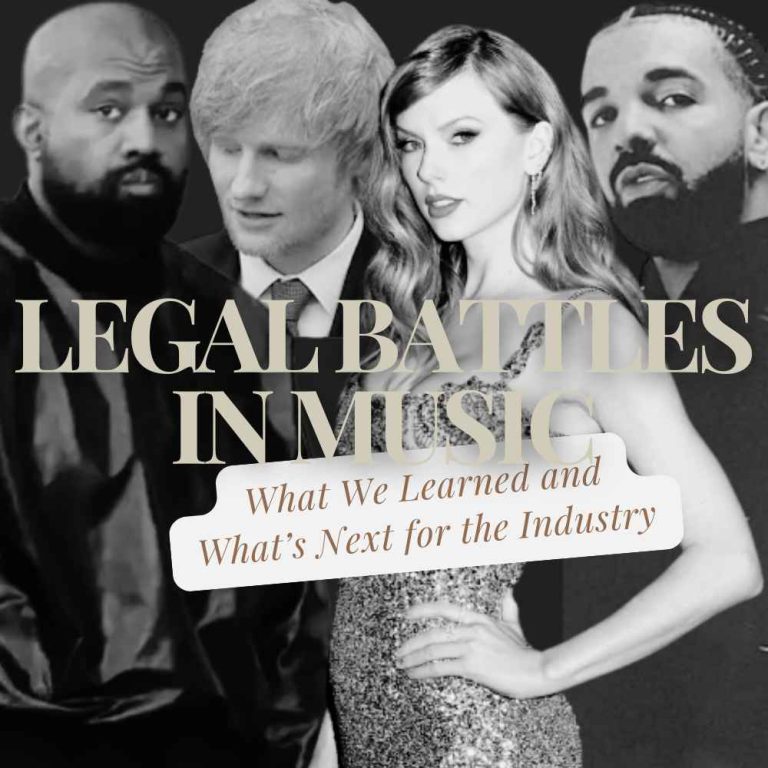
As the music industry evolves, legal disputes play a significant role in shaping its future. At Music Industry Weekly, we keep our readers informed about these pivotal cases and their long-term implications.
1. Drake vs. Vogue
This past year, rap superstar Drake faced off with fashion magazine Vogue in a high-profile legal battle. The dispute began when Drake used a mock Vogue cover to promote his latest album. Condé Nast, Vogue’s parent company, filed a lawsuit. They claimed that the fake cover infringed on their trademark and confused consumers.

The court ruled in favor of Condé Nast, determining that Drake’s use of the brand crossed legal boundaries. This case has set a precedent for how artists can use parody and established brands in their promotional content.
As a result, artists and their teams are likely to approach such strategies with greater caution in the future, balancing creative expression with respect for intellectual property rights.
2. Ed Sheeran’s Copyright Case
Ed Sheeran recently won a significant copyright infringement lawsuit. The plaintiffs had claimed that his hit song “Shape of You” closely resembled another track. However, the court ruled in favor of Sheeran, concluding that the similarities were not substantial enough to constitute infringement.
This ruling underscores the importance of understanding the fine line between inspiration and copying. It has also provided clarity on what constitutes copyright infringement, especially in cases where the boundaries are blurred. Consequently, songwriters and producers are now more aware of the need to document their creative processes. They’ve also learned to be cautious when drawing inspiration from existing works.

3. Kanye West and the Yeezy Dispute
Kanye West faced a legal challenge over his Yeezy brand, involving allegations of breach of contract and trademark infringement with a former business partner. The dispute ended in a settlement, with West retaining control over the Yeezy brand.

This case highlights the complexities artists face when managing multiple business ventures. The outcome underscores the necessity for clear and enforceable contracts, particularly when an artist’s brand spans multiple industries.
For artists looking to diversify their portfolios, this case serves as a reminder of the importance of solid legal foundations in business agreements.
4. Taylor Swift’s Re-Recording Rights
Taylor Swift‘s decision to re-record her earlier albums in response to disputes over her master recordings has sparked widespread discussion about artists’ rights. Although her re-recording process continues, many of the legal challenges have been resolved, allowing Swift to proceed with her re-releases.
This situation has become a landmark case in the music industry. It highlights the importance of contract negotiation and the potential for artists to regain control over their work. Swift’s approach may inspire other artists to consider re-recording as a viable strategy for reclaiming their rights. Especially when faced with unfavorable contract terms.

5. NFTs and Intellectual Property
The rise of NFTs (non-fungible tokens) has introduced new legal challenges, particularly concerning copyright infringement, trademark violations, and the unauthorized use of artists’ likenesses. Several cases in 2023 and 2024 have set important precedents for how intellectual property laws are applied in the digital space.
These rulings have clarified the legal landscape for NFTs in the music industry, establishing guidelines for the ownership, distribution, and monetization of digital music assets. As the industry continues to explore the potential of NFTs, these cases will serve as a foundation for future legal frameworks in the digital marketplace.
Implications for the Industry
The outcomes of these legal battles have far-reaching implications for the music industry. They have redefined the boundaries of intellectual property rights, influenced how contracts are negotiated, and shaped the way artists promote and monetize their work. As the industry continues to evolve, staying informed about these developments is crucial for artists, labels, and other stakeholders.
At Music Industry Weekly, we remain committed to providing comprehensive coverage of these and other significant legal issues affecting the music industry. As new challenges arise, we will continue to offer insights and analysis to help you navigate the ever-changing landscape of music law.
In conclusion, the resolution of these cases has set new standards and expectations for the music industry. Whether it’s navigating intellectual property rights or managing multi-industry brands, the lessons learned from these legal battles will influence the future of music. Stay tuned to Music Industry Weekly for ongoing updates and expert commentary on these critical issues.